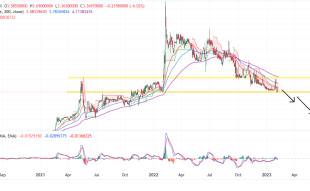Join Our Telegram channel to stay up to date on breaking news coverage
The newly appointed head of the Bank for International Settlements (BIS) ‘Innovation Hub’, Cecilia Skingsley, predicts a bright future for the crypto market and central bank digital currencies (CBDCs), though also had some CBDC criticisms. Despite the turmoil in the crypto market last year, resulting in over $2 trillion being erased, Skingsley believes the industry will recover and evolve, she told Reuters in a recent interview.
“I would assume that the industry will learn from these failures and they will come up with new things,” said Skingsley.
Skingsley, a former Swedish central banker, added that the recent turmoil has not deterred central banks from pursuing CBDCs, with over 100 countries representing over 95% of global GDP now exploring the technology. She sees CBDCs as an important step for governments to ensure payment system resilience while maintaining public policy objectives.
https://twitter.com/RNewspost/status/1622706649260605441
“You need be resilient enough when it comes to defence, when it comes to food supply, but it also becomes important when it comes to payment systems,” Skingsley said. “I can understand the rationale for any country to ask, all right, how resilient are we? Which countries can be our friends, our allies?”
CBDCs, which can be used for both public and private use, are being developed to modernize currencies and make cross-border transactions easier and cheaper.
Skingsley also commented on the low adoption of some CBDCs and other CBDC criticisms voiced by some central bankers, including the head of the Bank of England Andrew Bailey. She acknowledged the challenges but emphasized the importance of trust in the money system, especially as physical cash usage decreases globally and big tech companies and DeFi threaten the power countries have over monetary policy. International sanctions have been a driving factor in the evolution of CBDCs as well.
“If you extrapolate the cash usage in many countries, cash will no longer be used as a payment method some time in the future,” said Skingsley. “That opens up the question of how do you maintain public policy objectives that we think are important–namely trust in the money system.”
However, Skingsley believes that while CBDCs will make currencies more high-tech and easier to send between countries, they will only be fully interoperable between geopolitically aligned countries. This, Skingsley said, is a reality and a CBDC criticism that must be faced.
Other CBDC Criticisms
Critics of CBDCs argue that they could lead to a loss of privacy and centralization. Privacy advocates argue that CBDCs will make it easier for governments and financial institutions to monitor transactions and individual spending habits. This, they say, could lead to a loss of privacy and an increase in government control over citizens’ financial lives.
Another criticism of CBDCs is the potential for centralization. Since CBDCs are created and maintained by central banks, there are concerns that they will increase the power and influence of these institutions. Some believe that this centralization could lead to a concentration of power, which could result in a loss of financial freedom and independence.
“They would give the government total control and oversight over every person’s holdings and transactions,” wrote Aubrey Strobel in a January 27 Newsweek opinion piece. “In an ironic inversion of bitcoin’s fundamental objectives as an anti-inflationary, decentralized currency free from third-party mediation, CBDCs would appropriate mainstream interest in Bitcoin and principles such as security and decentralization that have become synonymous with Bitcoin, while being its antithesis. CBDCs are a highly centralized form of currency absent of Bitcoin’s anti-inflationary properties as the government could continuously mint more of the digital currency just as it does with fiat currency, constantly devaluing it.”
CBDCs are completely optional and made for your safety and convenience.
Unless you don’t use it (Nigeria’s eNaira CBDC only has 0.5% adoption). Then you will be forced to use it through withdrawal limits and demonetization.
The world would be so dark without #Bitcoin. https://t.co/qnsDtE4PrT pic.twitter.com/nqiUj3DRy0
— Samson Mow (@Excellion) January 13, 2023
Critics also argue that there are concerns that the deployment of CBDCs could cause financial disruption and lead to economic instability, particularly in countries with weak financial systems.
A January research report from the Bank of America also had some CBDC criticisms and noted some of these risks as well.
The report outlined the dangers associated with an emergence of competition between commercial banks and central banks. According to BoA analysts, CBDCs could prove more advantageous than traditional bank accounts as they may remain stronger stores of value in times of crisis.
By allowing customers of commercial banks to rapidly and easily move their funds into a central bank currency on a blockchain, it could have drastic consequences for the traditional model that these organizations operate under–including a difficulty of commercial banks in continuing borrowing and lending activities with customer savings account deposits, while also making bank runs more likely.
“During times of stress in the banking system, people could withdraw deposits and exchange them for CBDCs, given that there is no credit or liquidity risk if distributed with the direct and hybrid approaches, increasing financial stability risks,” the BoA report noted.
The report further acknowledged that the public may experience a loss of privacy and anonymity when adopting CBDCs, but proposed an effective policy-based compromise in response.
“Payments using CBDCs can remain anonymous if a legal framework exists providing a central bank or government the right to trace transactions if there are indications of criminal activity, tax evasion, money laundering or terrorism financing,” the report stated. “But purely anonymous payments are anathema to central banks.”
How this would be a compromise, exactly, since ultimately governments could still use CBDCs to track finances, is not clear. As the technology develops and further research is conducted, it’s possible that concerns around privacy, centralization, inequality, and financial disruption may be addressed. Only time will tell how this new form of currency will be received and adopted, however–and if these CBCD criticisms are valid–but for now, the future of CBDCs is uncertain and they remain an experiment in the rapidly changing world of global finance.
Related:
Sberbank Aims To Have Own DeFi Platform Up And Running By May
U.S. mortgage lenders gave crypto banks billions of dollars: Report
Join Our Telegram channel to stay up to date on breaking news coverage


